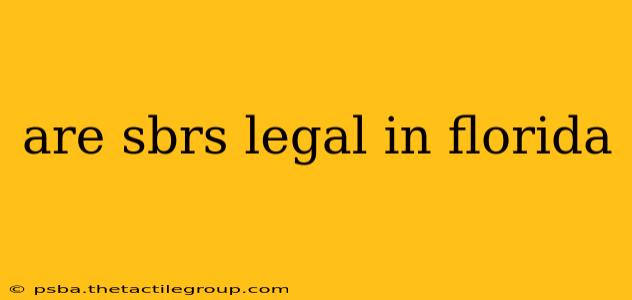The legality of Short Barreled Rifles (SBRs) in Florida, like in other states, hinges on a complex interplay of federal and state laws. Understanding these regulations is crucial for responsible firearm ownership. This guide provides a clear and concise overview, but remember, this information is for educational purposes only and does not constitute legal advice. Always consult with a qualified legal professional before making any decisions regarding firearm ownership.
Federal Regulations Governing SBRs
The core federal law impacting SBR legality is the National Firearms Act (NFA) of 1934. This act mandates registration and taxation of SBRs, classifying them as "firearms" subject to strict regulations. Key requirements under the NFA include:
- Registration: SBRs must be registered with the Bureau of Alcohol, Tobacco, Firearms and Explosives (ATF). This involves submitting Form 1, undergoing a background check, and paying a tax.
- Tax Stamp: Upon approval of the registration, the ATF issues a tax stamp, which serves as legal documentation of ownership.
- Background Checks: A thorough background check is mandatory for all applicants.
Failure to comply with these federal requirements results in severe penalties, including hefty fines and imprisonment.
Florida State Laws and SBRs
Florida law largely aligns with federal regulations concerning SBRs. There are no state-specific laws that explicitly prohibit or further restrict the ownership of legally registered SBRs. However, Florida does have its own set of firearm laws, and it's crucial to be aware of these as they pertain to storage, transportation, and carrying of all firearms, including SBRs. This includes considerations about:
- Concealed Carry: Florida's concealed weapons permit laws do not typically extend to SBRs due to their classification under the NFA.
- Open Carry: Open carry laws in Florida are also complex and could indirectly affect the carrying of an SBR.
- Storage and Transportation: Secure storage and safe transportation practices must always be observed.
Obtaining an SBR Legally in Florida
The process of legally acquiring an SBR in Florida involves navigating both federal and state regulations. The steps generally include:
- ATF Form 1 Submission: Completing and submitting the ATF Form 1 application for manufacturing a SBR. This form requires detailed information about the firearm and the applicant.
- Background Check: Undergoing a thorough background check conducted by the ATF.
- Tax Payment: Paying the applicable tax for the SBR.
- Approval and Tax Stamp: Receiving approval from the ATF and the subsequent tax stamp, signifying legal ownership.
This process can be time-consuming, often taking several months or longer, due to the rigorous vetting process.
Understanding the Penalties for Illegal SBR Possession
Possessing an unregistered SBR in Florida carries significant penalties under both federal and state law. These can include:
- Heavy Fines: Substantial financial penalties.
- Imprisonment: Potential jail time.
- Loss of Gun Rights: Permanent revocation of the right to own firearms.
Conclusion: Navigating the Complexities of SBR Ownership in Florida
The ownership of SBRs in Florida requires strict adherence to both federal and state regulations. The process is intricate and demands careful attention to detail. It is highly recommended to seek legal counsel from a firearms attorney specializing in NFA regulations before attempting to obtain or possess an SBR in Florida. This ensures compliance with all relevant laws and minimizes the risk of legal ramifications. Remember, ignorance of the law is not a defense. Prioritize responsible and legal firearm ownership.

